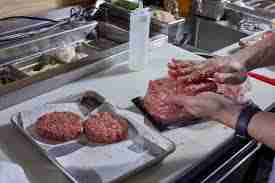The plant-based meat market has witnessed exponential growth in recent years, fueled by increasing consumer demand for healthier, more sustainable alternatives to traditional animal-based products. As environmental concerns, health considerations, and ethical issues become more prominent in the global conversation, the future of plant-based meats looks promising, with innovative advancements driving the market forward. In this article, we explore the key trends shaping the future of the plant-based meat market, from technological innovations to evolving consumer preferences, market competition, and sustainability efforts.

1. Technological Advancements: The Rise of Better Meat Alternatives
Technology will continue to play a significant role in shaping the future of plant-based meats. With companies competing to create products that mimic the taste, texture, and sensory experience of animal meat, technological advancements are pushing the boundaries of what plant-based alternatives can achieve. Some of the future trends include:
A. Heme and Flavor Innovation
The development of heme (an iron-rich molecule that gives meat its distinctive flavor) in plant-based meats will continue to be a game-changer. Companies like Impossible Foods have already made significant strides by incorporating soy leghemoglobin, a plant-based version of heme, into their products. In the future, further innovation in flavor science will allow plant-based meat alternatives to achieve even closer approximations to the taste and juiciness of traditional meat, appealing to an even broader consumer base.
B. Precision Fermentation and Cultured Meat
Another area of rapid technological advancement is precision fermentation. This process allows microorganisms like yeast, bacteria, and fungi to produce proteins, fats, and other key ingredients found in animal products. Precision fermentation has the potential to accelerate the development of plant-based meat alternatives, with companies utilizing this technology to create more realistic meat textures and nutritional profiles.
Moreover, cultured or lab-grown meat is gaining traction as a way to produce meat without the need for livestock. By cultivating animal cells in controlled environments, companies can create muscle tissue that closely resembles real meat. While still in its infancy, cultured meat is expected to have a significant impact on the future of the plant-based meat market, particularly in terms of ethical considerations and sustainability.
2. Evolving Consumer Preferences: From Vegans to Flexitarians
As the plant-based meat market grows, one of the most notable shifts is the evolving consumer base. Initially, plant-based products were targeted primarily at vegans and vegetarians. However, with more people adopting flexible diets, the appeal of plant-based meat is extending beyond these niche groups.
A. The Rise of Flexitarianism
One of the most significant trends shaping the future of plant-based meats is the increasing adoption of flexitarianism. Flexitarians are individuals who primarily eat plant-based foods but occasionally include animal products in their diet. This growing segment of the population is driving the demand for plant-based alternatives that taste similar to meat while offering environmental and health benefits.
As more consumers seek to reduce their meat consumption for health, environmental, or ethical reasons, the plant-based meat market will expand to cater to this flexible approach to eating. Brands will continue to refine their products to make them more appealing to this broader audience, offering a greater variety of flavors, textures, and formats.
B. Health-Conscious Consumers
The future of the plant-based meat market will also be influenced by the rising number of health-conscious consumers. Increasing awareness of the health risks associated with excessive red meat consumption, such as heart disease, diabetes, and cancer, has led more people to seek healthier alternatives. Plant-based meats offer a lower-fat, cholesterol-free alternative to traditional animal products, making them an attractive option for health-focused consumers.
Additionally, as consumers become more educated about the benefits of plant-based diets, companies will need to ensure that their products meet the nutritional needs of a diverse population. Expect to see more plant-based meat options that are fortified with vitamins and minerals, such as B12 and iron, which are often deficient in vegan diets.
3. Expansion of Product Offerings: Beyond Burgers and Sausages
In the early days of the plant-based meat movement, the primary focus was on creating alternatives to burgers and sausages. However, as demand has diversified, plant-based meat companies are expanding their product lines to cater to a wider range of tastes and dietary preferences.
A. Plant-Based Seafood
One of the most exciting future trends in the plant-based meat market is the rise of plant-based seafood. Companies like Good Catch and New Wave Foods are leading the charge in creating plant-based alternatives to fish and shellfish. These products are made from plant ingredients such as algae, lentils, and chickpeas, offering a sustainable and ethical solution to the overfishing crisis. As more consumers seek to reduce their environmental impact and avoid the ethical concerns of seafood production, plant-based seafood will likely become a key player in the plant-based market.
B. Plant-Based Ready-to-Eat Meals
The demand for convenience continues to rise, and the plant-based meat market is responding with new product offerings that make plant-based eating more accessible. Ready-to-eat meals, frozen dinners, and pre-packaged meal kits are gaining popularity among busy consumers. Brands like Tattooed Chef, Amy's Kitchen, and Greenleaf Foods are providing plant-based meal options that require minimal preparation. As the market grows, consumers can expect to see more innovative plant-based meal offerings that cater to various cuisines, tastes, and dietary preferences.
4. Sustainability: A Key Driver of Market Growth
Sustainability will continue to be a major factor influencing the future of the plant-based meat market. As the environmental impact of traditional meat production becomes more apparent, consumers are increasingly looking for alternatives that are less taxing on the planet.
A. Eco-Friendly Packaging
In the coming years, plant-based meat companies will increasingly focus on developing eco-friendly packaging solutions. With growing concerns over plastic waste, many companies are exploring biodegradable, recyclable, and compostable packaging materials. This shift toward more sustainable packaging aligns with the broader trend of environmental consciousness among consumers and will likely become a key selling point for plant-based meat brands.
B. Reduced Environmental Footprint
The environmental benefits of plant-based meats are well-documented. Producing plant-based protein requires far fewer resources, such as water, land, and energy, compared to conventional meat production. As the demand for sustainable food products rises, the plant-based meat sector will continue to focus on reducing its carbon footprint and minimizing its impact on the environment. Companies will prioritize sourcing ingredients responsibly, utilizing regenerative agricultural practices, and adopting more energy-efficient manufacturing processes.
5. Regulatory and Legal Developments
As the plant-based meat industry expands, regulatory frameworks will play a key role in shaping its future. Governments around the world will need to establish clear guidelines on labeling, food safety, and the approval of novel ingredients, such as those used in cultured meat.
A. Labeling and Marketing Regulations
One of the key regulatory issues facing the plant-based meat market is the use of traditional meat-related terms like "burger" or "steak" on plant-based products. While some traditional meat producers have pushed for restrictions on these terms, plant-based brands argue that they accurately describe the products. As the market continues to grow, policymakers will need to navigate this issue carefully to ensure that labeling is clear and accurate, without stifling innovation.
B. Safety Standards for Cultured Meat
Cultured meat, or lab-grown meat, will face additional regulatory scrutiny as it becomes more prevalent. Governments will need to establish food safety standards and approval processes for these products to ensure they are safe for consumption. As cultured meat becomes more mainstream, regulators will have to balance safety concerns with the potential environmental benefits of this emerging technology.
Conclusion: A Bright Future for Plant-Based Meat
The plant-based meat market is poised for continued growth, driven by technological advancements, shifting consumer preferences, and the rising demand for sustainable food alternatives. As the industry matures, we can expect to see even more innovation in product offerings, production processes, and sustainability efforts. With plant-based meats becoming more accessible, convenient, and realistic in taste and texture, the future of this market looks bright. Whether driven by health, ethical concerns, or environmental consciousness, consumers are increasingly turning to plant-based meat as the future of food—one that aligns with a more sustainable, healthy, and compassionate way of eating.




